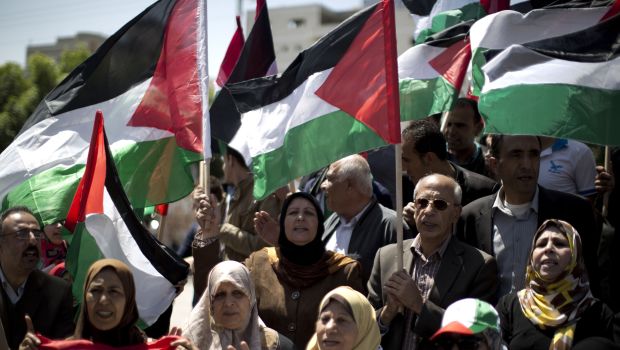
Palestinians take part in a demonstration in Gaza City on April 22, 2014, supporting a new attempt to reconcile the militant Islamist movement Hamas and its Palestine Liberation Organisation (PLO) rivals (AFP PHOTO /MAHMUD HAMS)
Ramallah, Asharq Al-Awsat—Palestinian President Mahmoud Abbas has begun negotiations to form a national unity government following the recent reconciliation agreement between Fatah and Hamas.
Azzam Ahmad, who leads the five-member reconciliation delegation and is a member of Fatah’s Executive Committee, is expected in Gaza within days to hold discussions with Hamas on the formation of a unity government and other related issues.
Bassam Al-Salehi, one of Fatah’s five-member reconciliation delegation, told Asharq Al-Awsat on Monday: “Talks on forming the Palestinian national unity government began in a calm atmosphere, but have not reached the stage of nominating specific figures [to positions in the interim government] as yet.”
Salehi said the discussions were still at an early stage but were not expected to take a long time, saying the discussions with Hamas and other factions “would expand in the coming days.”
Fatah and Hamas have been at odds since Hamas’s victory in the 2007 Palestinian legislative elections, which led to violent clashes that left Hamas in control of the Gaza Strip and Fatah in control of some areas of the West Bank.
Previous attempts to broker an accord between the two sides, in Doha and Cairo in 2012, have not succeeded.
The two sides’ latest attempt at a reconciliation, agreed last month, follows the collapse of the latest round of Arab–Israeli peace talks and mounting political pressure on both parties from a variety of sources.
Despite the previous failures, Salehi said the process was moving in the right direction. “There are no obstacles so far and we do not expect any serious obstacles,” he said, adding that “discussions with Hamas will focus on sovereign ministries,” namely the interior, finance, education and foreign ministries.
The two parties are expected to each nominate a list of candidates to head various ministries, then try to arrive at a consensus on a final cabinet that contains figures from each.
It is understood that Hamas suggested the government be headed by someone other than Abbas, who is a member of Fatah, but it did not object to him staying in office, in accordance with the Cairo and Doha agreements.
In response to a question on Israeli demands for recognition, Salehi said: “The government will not be political, it will be a technocratic government. Political matters will be the responsibility of the Palestine Liberation Organization (PLO), including the [peace] negotiations, but even then, the president is the one who will decide the political stance in the end.”
Salehi added that all sides agreed not to demand any faction recognize Israel.
Israeli sources said on Monday that Abbas told US officials he would not ask Hamas to recognize Israel, and that it was not obliged to do so. According to the same sources, Abbas said the government he would form would not include ministers from any Palestinian political factions, instead giving experts and technocrats ministerial portfolios.
According to the agreement signed on April 23, which set a five-week deadline, Fatah and Hamas have two weeks left to form an interim government.
That government would be tasked with preparing the ground for presidential and legislative elections within at least six months, as well as attempting to resolve the outstanding issues between the two Palestinian factions.
In the April 23 agreement, the two sides also said they would release detained members of each faction, re-hire civil servants fired for being members of rival parties, and integrate others. They also agreed to activate the leadership framework of the PLO and restart the work of the Legislative Council, on the condition that it reviews laws passed while it was inactive.
Security will remain in the hands of Hamas in Gaza and Fatah in the West Bank until elections are held.
In a sign of the thaw between the two sides, press censorship in Gaza and the West Bank has recently been eased, and newspapers published or sympathetic to each faction have been allowed to circulate in both territories once again.
